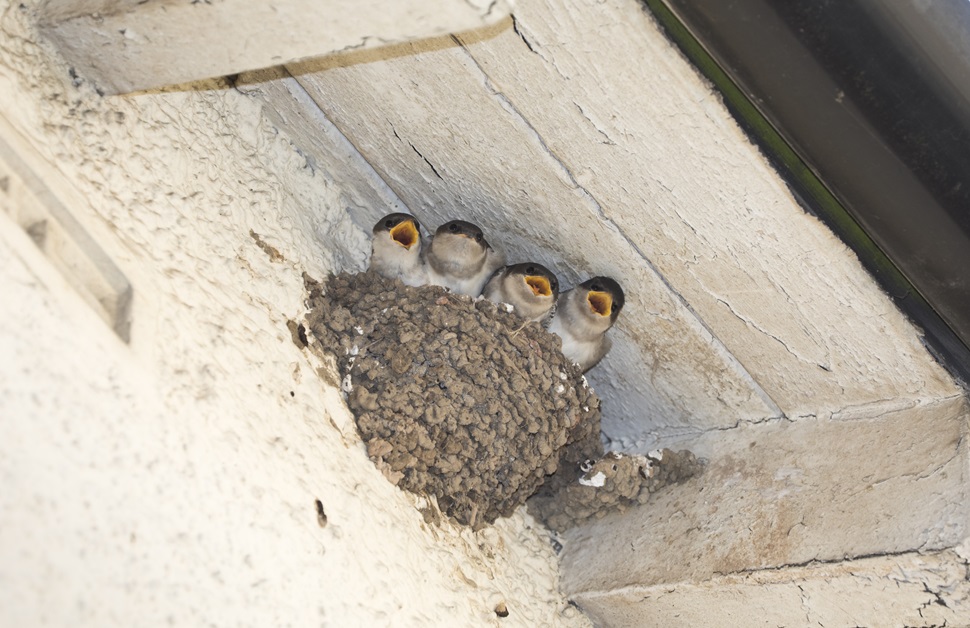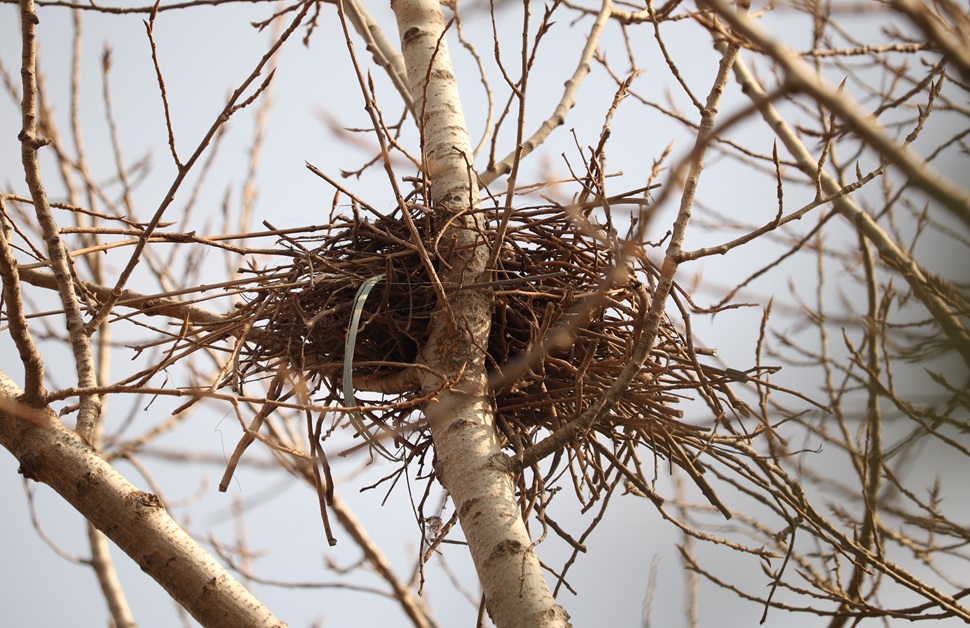An estimated 250+ species of birds populate the UK, and the majority of breeds remain present throughout the year regardless of weather conditions. With so many birds featured in the common bird census and other sets of statistics over breeding birds, nesting birds and wintering birds, it can be easy to inadvertently disturb them or damage their active nests, particularly as a result of a development project staged on the specific plot of land.

Nesting Birds
A bird’s nest is a carefully designed collection of nesting materials such as grass, leaves, moss and twigs used to store eggs and ensure that their dependent young are safe from danger. Across certain periods in the year, birds will nest within a suitable habitat to keep themselves and their eggs safe from harm, destructive weather and other potential impacts.
Numerous activities carried out by humans could, however, impact nesting birds all year round and at any point in the year, including different exercises within the planning process that see appropriate development work commencing, leading to a need for afforded additional protection over birds.
Can You Disturb Nesting Birds?
Despite the efforts of birds to create strong, durable and insulated nests, human intervention at the development site can cause multiple problems for birds. Not only that, but it isn’t simply physical interference, with humans capable of disrupting breeding and nesting birds through the introduction of lighting, noise and vibration in inhabited areas of the site.
Methods of disturbing nesting birds could range from practices as simple as pruning, lopping, trimming or cutting trees, hedges and other vegetation to processes as elaborate as demolition, removal or development works.
Is It Illegal to Disturb Nesting Birds?
Every type of wild bird – along with their eggs and nests – is protected by law within the rules of the Wildlife and Countryside Act 1981. Schedule 1 wild birds that fall within the legislation include the barn owl, black redstart, dartford warbler or lapwing. Unlike the majority of protected species surveys that will enable the developer to obtain a license that will facilitate the ability to disturb several species of animals and destroy important habitats, it is not possible to do the same for wild birds.
Additionally, one of the many duties of local planning authorities is to conserve, preserve and protect ecological features within their jurisdiction during development projects to contribute to the retention and enhancement of local biodiversity, and certain species of birds listed possess further protection during nesting and breeding activity. Without the correct survey methods, field surveys, survey transects and category of survey effort, the local authority will struggle to grant the planning application.
Checking for Nesting Birds
Undertaken with a sole focus on nesting birds situated on the development site, a nesting bird check is a form of ongoing management and maintenance that allows a qualified and suitably experienced ecologist to visit the site, carry out a physical inspection and analyse the continued safety of present birds after a prior breeding bird survey.
Also sometimes known as a breeding bird check, a nesting bird check incorporates multiple considerations, such as the ecological and legal sides. And through gaining the insights of a qualified ecologist, the developer and any other stakeholders in the planning process can make changes to their project that will enable it to continue.
At the point of arranging for nesting bird checks to be carried out, a nesting bird survey or breeding bird survey will have already been undertaken beforehand. The prior protected species surveys on breeding or nesting birds will have established the present bird species and any conflicts between them and the plans of the development.
Why Do I Need a Nesting Bird Check?
If a site has the potential to house nesting birds, a nesting bird check will be required to ensure that all wild birds, eggs and active bird nests are unharmed by the planning project. Nesting bird checks or breeding bird checks only need to be conducted during breeding bird season; development proposals carried out between September and February will not need a bird survey of this nature. It is also important to note that nesting bird checks will be needed prior to disrupting development works such as demolition work and vegetation clearance by a minimum of at least one hour.
Failure to arrange a nesting bird check when needed will likely lead to penalties, as wild birds are protected by UK law, making it an offence to unintentionally or intentionally kill, injure or take any wild birds, or damage, destroy or steal their eggs or nests. In fact, wild birds are protected by law to such a degree that it is even an offence to interfere with a bird nest both while it is in use or being built. Depending on the severity of the situation, penalties for breaching legislation around wild birds could include an unlimited fine or up to six months in prison.
When Do Birds Nest?
Although there isn’t technically a defined and predetermined bird nesting season, many types of birds in the UK nest and breed in the warmer months of the year, usually spanning from March to August. As such, ecologists won’t need to conduct a nesting bird check between the months of September and February. It is also highly likely that they will advise undertaking any development work outside of this period to minimise disturbance to wild birds inhabiting the site.

Nesting Bird Check Methodology
In order for our nesting bird checks to follow a consistent and reliable formula, we must operate within a specific best practice methodology. Between UK legislation, requirements from local councils and our own survey process, we have developed a nesting bird check methodology that ticks all boxes and satisfies every involved stakeholder.
For more information on how we typically carry out nesting bird checks, we have given a brief outline of the process below:
How to Check for Nesting Birds
On the day of a nesting bird check, an ecological surveyor will attend the development site to undertake a thorough physical inspection of nests that were previously identified during the breeding bird survey. The ecologist will observe the site for each active bird nest in the area, marking any within exclusion zones that will insist on construction staff working outside of them until all birds have departed.
A nesting bird check will usually take more than one hour to complete, and if it isn’t possible for all vegetation to be inspected, the ecological consultant will need to be present to supervise and monitor the clearance. As with all ecological surveys, a report detailing the process, findings from the check and recommendations that will guarantee adherence to the law will be developed by the ecologist and passed on to the developer.
Nesting Bird Check Guidance
Without impactful results from a licensed and qualified ecological consultancy, your nesting bird check will not carry the trustworthy information needed to progress your project into future stages. For this reason alone, it is crucially important that you reach out to an accountable company such as Arbtech.
We have been satisfying clients across the UK and beyond for more than a decade with a wide range of ecological and arboricultural surveys. Through speaking to us, our helpful and friendly team can inform you on the most effective assessment to suit your needs, and if you want proof of our past and present services, check out our reviews.
Nesting Bird Check Ecologists
Whenever a client books a nesting bird check with us, one of our team of ecologists located near the site will arrange a date and time to undertake the inspection. Providing it suits the client’s schedule, the desirable date and time will be booked in and the checks will be able to go ahead, with the majority of nesting bird checks lasting around one hour in total.
Each of our ecologists is qualified and capable of conducting nesting bird checks – along with an assortment of other ecology surveys – and they are situated across the UK, meaning we have licensed ecological consultants local to all areas. From the point at which birds start nesting between mid-March and late March to them carrying nesting material elsewhere in early July, our team can help.
Arranging a Nesting Bird Check
If you have been told you need a nesting bird check following a nesting bird survey or would simply like help with choosing the most suitable form of assessment on your development site, please get in touch by calling us using the number at the top of this page, filling out our quick quote form or by visiting our contact page.
We will then provide you with a free quote based on the specifications of your project and site prior to any vegetation removal or potentially disruptive development work. If you are happy to move forward, send the quote form back to us, and we will be able to arrange a date and time to carry out the nesting bird check.
Our ecology team will then be able to assist you with ensuring birds aren’t harmed as a result of your planning project, support breeding birds and/or nesting birds on your development site, avoid any potential breaches of active UK law, support your application for planning permission, and get your project moving into future stages.


